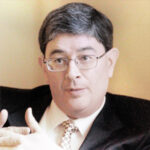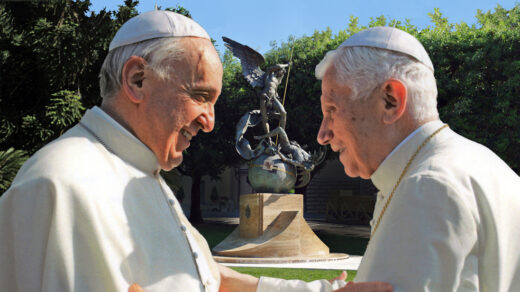One of my life’s great blessings has been to have known and worked with men and women whose books I first studied in college and graduate school. High on that roster of intellectual-mentors-become-friends-and-colleagues stands the late Peter L. Berger, the distinguished sociologist of religion who brought the humanities (including philosophy and theology) into his work as a social scientist, thereby enlivening and illuminating the number-crunching typical of his fellow sociologists. (Andrew Greeley once snarked that „the only numbers in Berger’s books are at the bottom of the page.” More power to Berger, say I.)
One of Peter’s best books, and his smallest, is very much worth reading fifty-five years after it was written. Its winsome title, A Rumor of Angels, was then explicated in a more stolidly academic subtitle (Modern Society and the Rediscovery of the Supernatural), which locates the book in recent cultural history.
A few years before Rumor’s publication, the April 8, 1966, issue of Time magazine shocked middle-class America with its stark black cover, on which was emblazoned a blunt question in large red letters: „Is God Dead?” The mid-1960s were the heyday of „secular theology,” which, to simplify greatly, tried to have Christianity without the supernatural: a school of thought popularized by Harvey Cox in The Secular City: A Celebration of Its Liberties and an Invitation to Its Discipline. As things turned out, of course, the „liberties” of a world without God—a world tone-deaf to the supernatural—were the polymorphous perversities of lifestyle libertinism, and its „disciplines” were the breakdown of the family, social solidarity, and public order.
A Rumor of Angels drove a stake through the desiccated heart of „secular theology” by demonstrating in ninety-seven finely wrought pages that, embedded in empirical reality, were „signals of transcendence”: which Berger defined as „phenomena . . . found within the domain of our ‘natural’ reality but that appear to point beyond that reality.” The most primal of these phenomena, Peter suggested, was that of a mother comforting a frightened child who „wakes up in the night, perhaps from a bad dream, and finds himself surrounded by darkness, alone, beset by nameless threats.” What will any good mother do? „She will speak or sing to the child and the content of this communication will invariably be the same—‘Don’t be afraid—everything is in order, everything is all right.’” Reassured, the child will go back to sleep, reassured that „everything”—the order of Being itself—is benign.
The fun and the sheer joy of play is another „signal of transcendence,” in which „it appears as if one were stepping not only from one chronology to another, but from time into eternity”—from this world into a grander reality that englobes and gives meaning to this world. Imagine a game in which you were completely absorbed while playing it—from cerebral chess to brawling rugby to standing at the foul line with the game at stake—and you’ll get the point.
And that brings us to baseball in this opening week of the Major League season. For baseball is a „signal of transcendence”—a window into the supernatural—in several ways.
Baseball is played on a field that is theoretically infinite. While the inner diamond is carefully calibrated in precise (some might say, divinely inspired) measurements—90 feet between bases, 60 feet 6 inches between pitching rubber and home plate—the foul lines and the outfield could, in principle, be extended forever: a possibility that came closest to realization in the vast center field of New York’s old Polo Grounds (which in turn gave birth to Hadley Arkes’s great historical mnemonic: „I can always remember when St. Augustine was born—it was 1,600 years before Willie Mays robbed Vic Wertz at the Polo Grounds„). Unlike a football gridiron, basketball court, or ice hockey rink, baseball is played in an environment that hints at infinity.
Then there is time. Before the advent of Manfred Man—the ghost runner who now mysteriously appears at second base in the tenth inning of a regular-season game—a baseball game was potentially endless: another signal of eternity embedded in empirical reality. Still, even with the aberration of Manfred Man and the new (and, I confess, welcome) pitch clock, the fact that a baseball game unfolds without a temporal countdown, unlike sports played within a fixed period of time, is another of Peter Berger’s rumors of angels: a quotidian experience that lifts us out of the humdrum of the here-and-now into a different, transcendent realm—a realm akin to the timelessness of heaven.
So: Play ball! And be attuned, at the ballpark and elsewhere, to those rumors of angels.
Ten tekst został opublikowany na łamach portalu First Things 3.04.2024




